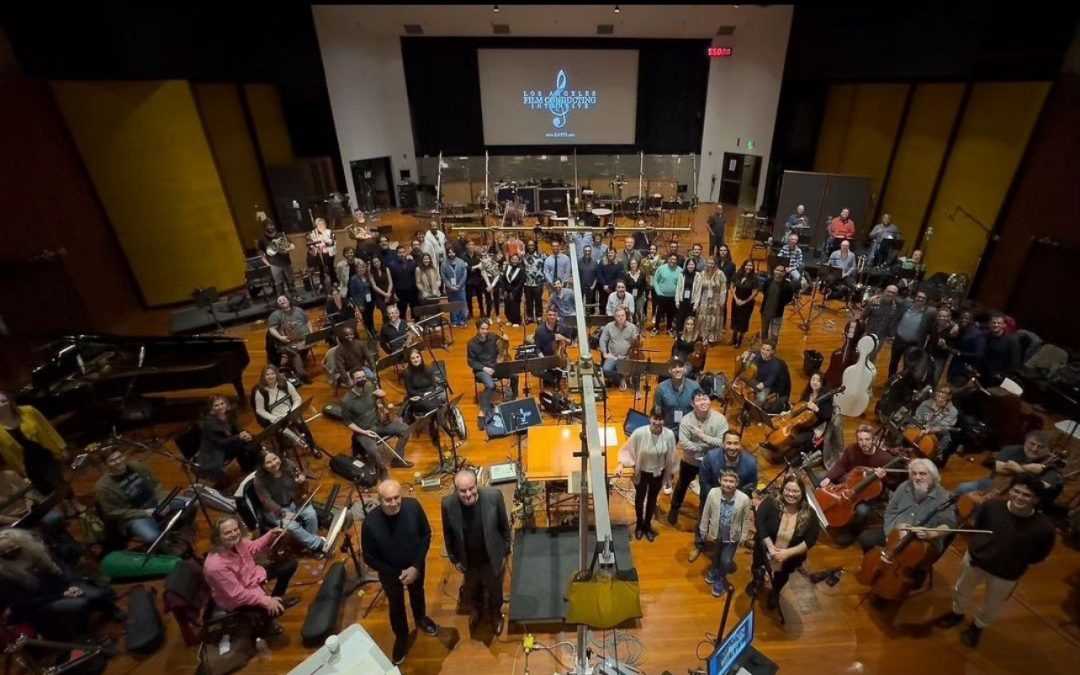Nacho Gonzalez Nappa is an award-winning composer and producer focusing on composing music for film and video games. Among his recent scores is Queering, a film nominated for the prestigious South by Southwest (SXSW) Film Festival, Kingdom Rush Vengeance, one of the most popular mobile video games in the Apple Store in the US and in China, as well as the score for the documentary Alexis Viera, a biography of the renowned soccer player available on Netflix. Recently, I had the privilege of talking to Nacho about his latest project, which involved a recording session with the Hollywood Symphonic Orchestra at Warner Bros Studios. We also delved into his recent teaching position at Berklee College, shedding light on his multifaceted role in the world of music and education.
AN: Hi Nacho, can you tell us about your recent recording session with the Hollywood Symphonic Orchestra at Warner Bros Studios?
NG: 2024 has been incredibly exciting from day one. I started my year touring India, performing and enjoying some of the best food on the planet. While I was in India, I was still preparing for the recording session with the Hollywood Symphonic Orchestra. The session took place mid January, at the Clint Eastwood Scoring Stage in Warner Bros Studios. Warner’s lot is a magical place. The moment you get inside, reality suspends. You no longer know what is real and what is fiction. You have “fake” metro stations, film sets, old cars, etc. You’re literally inside of a movie. This session was part of the Los Angeles Film Conducting Intensive, founded by Angel Velez and David Newman. I got to work and learn from some of the best talent in Hollywood, including legends Conrad Pope, Bill Ross, Emilie Bernstein and Blake Neely. The platform Angel has built is unprecedented in Hollywood. Thanks to his leadership, this legacy and art form is carried forward with a new generation of composers that is excited to write a new chapter.
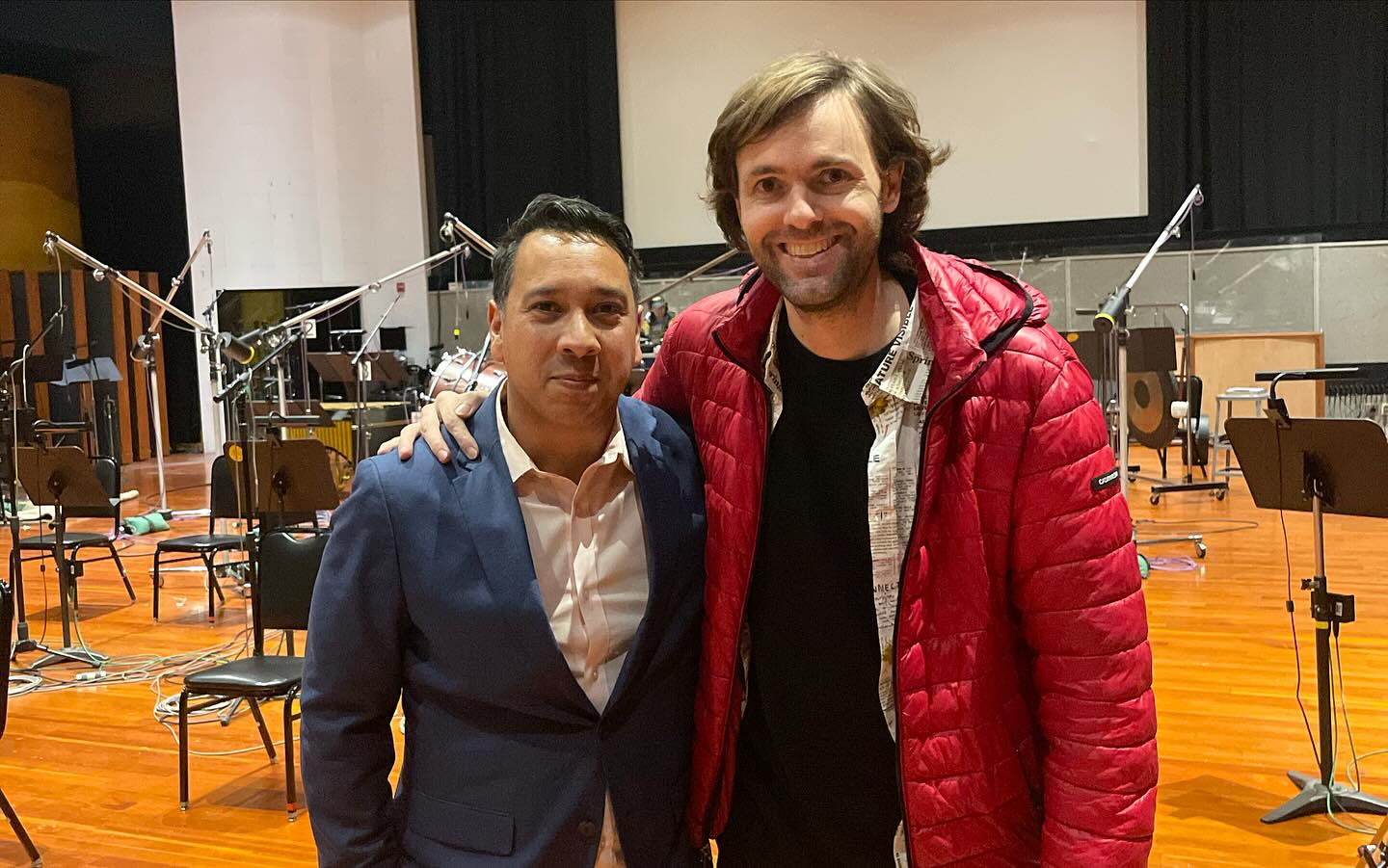
Nacho with Angel Velez
I never drove a Ferrari, but I guess that conducting the Hollywood Symphonic Orchestra must be the closest you can get. This level of studio musicianship is unbelievable. They not only are great sight readers, but they also understand the meaning of the notes. On the other hand, the players are incredibly excited to play new music. You can see their faces and how they get excited when they see a new challenging part.
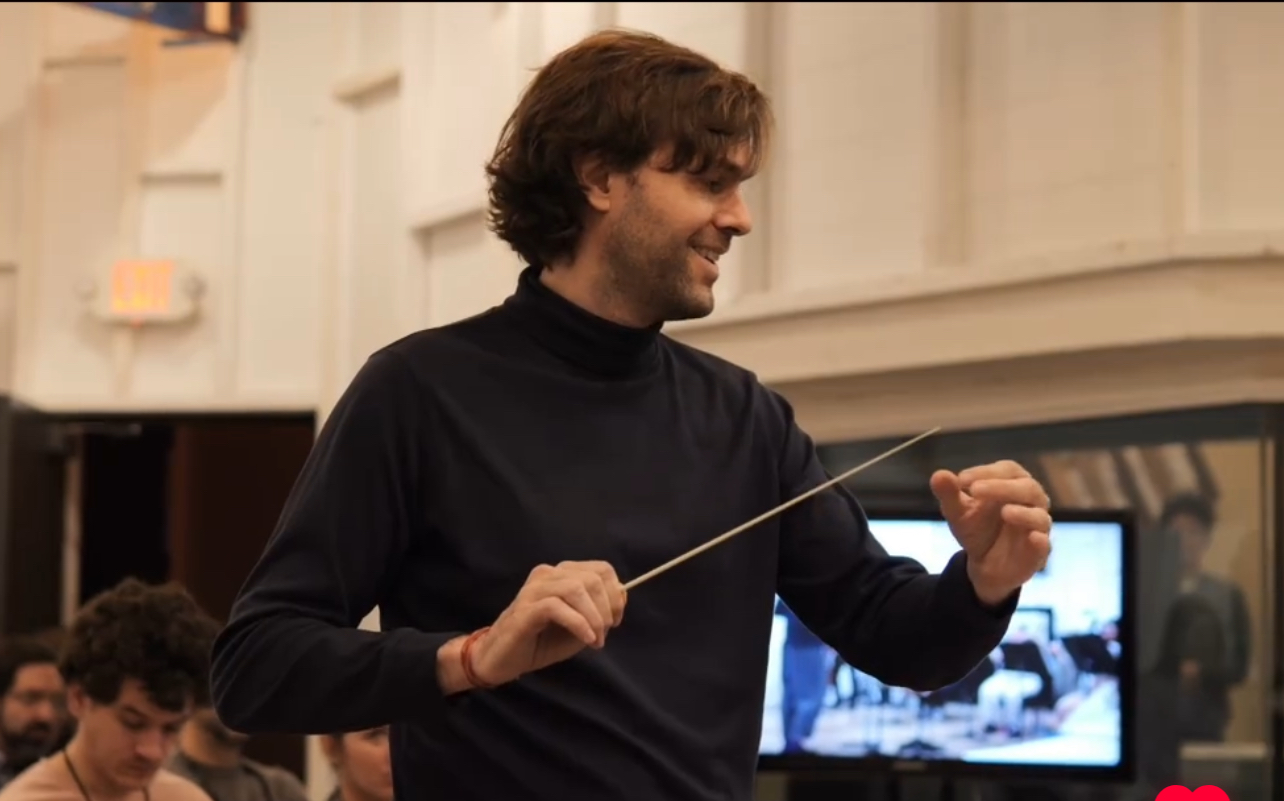
Nacho Gonzalez conducting the Hollywood Symphonic Orchestra
AN: Working with such renowned musicians must have been inspiring. How did you prepare for such a high-stakes recording session?
NG: In order for a session like this to go smoothly, you have to prepare a lot. Your parts must be like a love letter to each musician. Each of them has to feel important, and your message has to be super clear. You’ve a very little amount of time to record a lot of music. If there are articulations missing, if your engraving is poorly done, if your divisi or mutes are unclear, people will ask questions. This might not be a problem when you’re recording a string quartet, but if you’re recording a symphonic orchestra, things can get quickly out of control. The more questions they have, the less time you’ve to record, and the more expensive your session becomes. We try to solve every problem in advance. You have to consider the colour and weight of the paper you use, page turns, how you will approach challenging passages, etc.
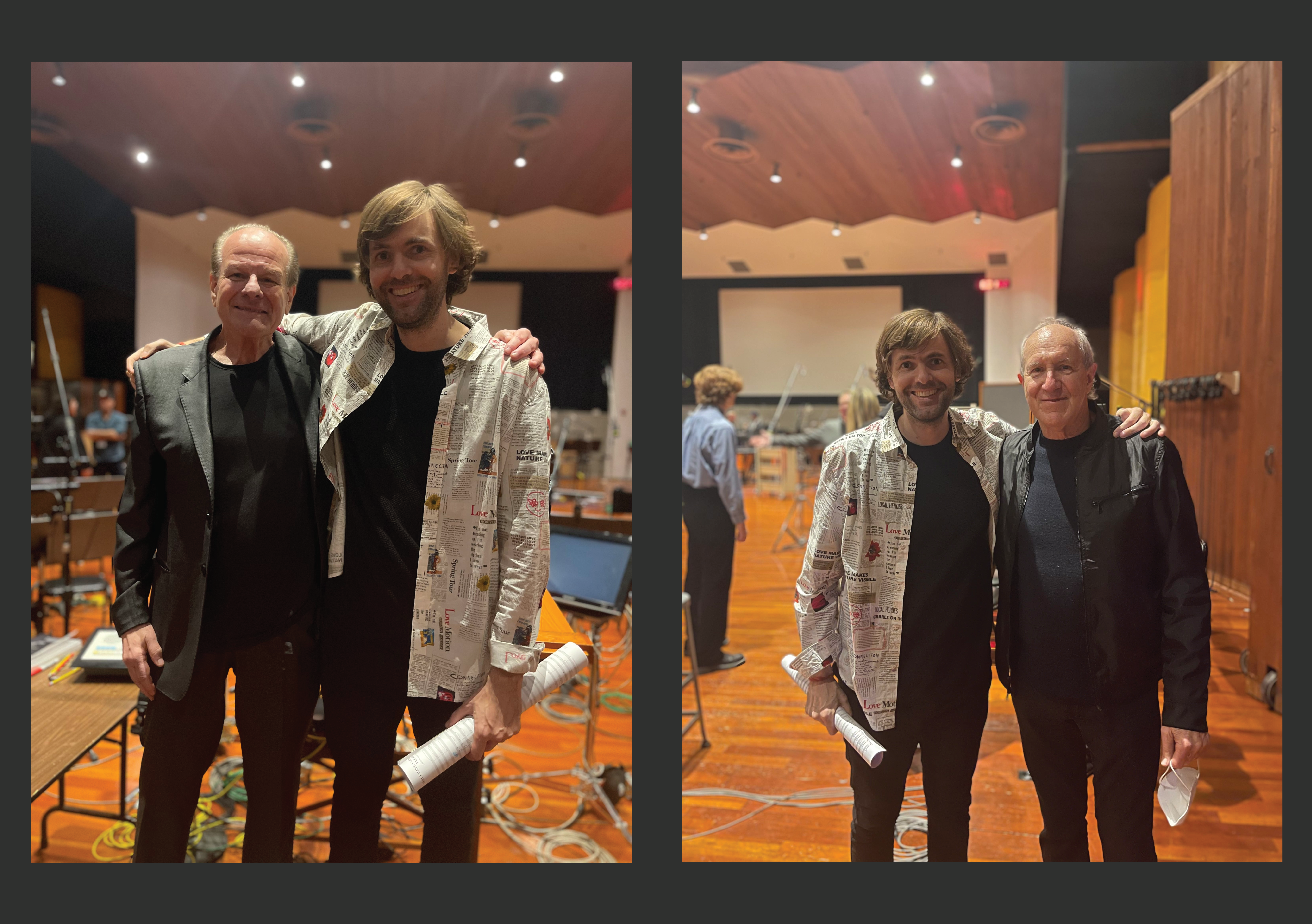
Nacho with Conrad Pope (L), and Bill Ross (R)

 AN: How did Dorico come into play during your preparation?
AN: How did Dorico come into play during your preparation?
NG: My music for this session was pretty challenging and I had a limited time to record it. I was also conducting the session. I had a pretty clear idea of how to approach challenging sections that I knew were going to require some time. Angel, Conrad and Bill were incredibly supportive and I was mind blown by the level of the orchestra. Before the session, I considered sending the score to a professional engraving house here in LA, but I found someone in the Dorico Facebook group that created a film scoring template with all the details I needed. I used that template, and I had to do minimal work to make it look 110% beautiful. That’s one of the many things I love about Dorico: the community. Whatever doubt you have, there’s always someone there ready and excited to help. That’s something really hard to build in these confrontative days we live in.
I switched to Dorico five years ago. I have to admit at the beginning it was tough, like learning a new language. But after the first project, I quickly understood the logic and it’s been a blast since then.
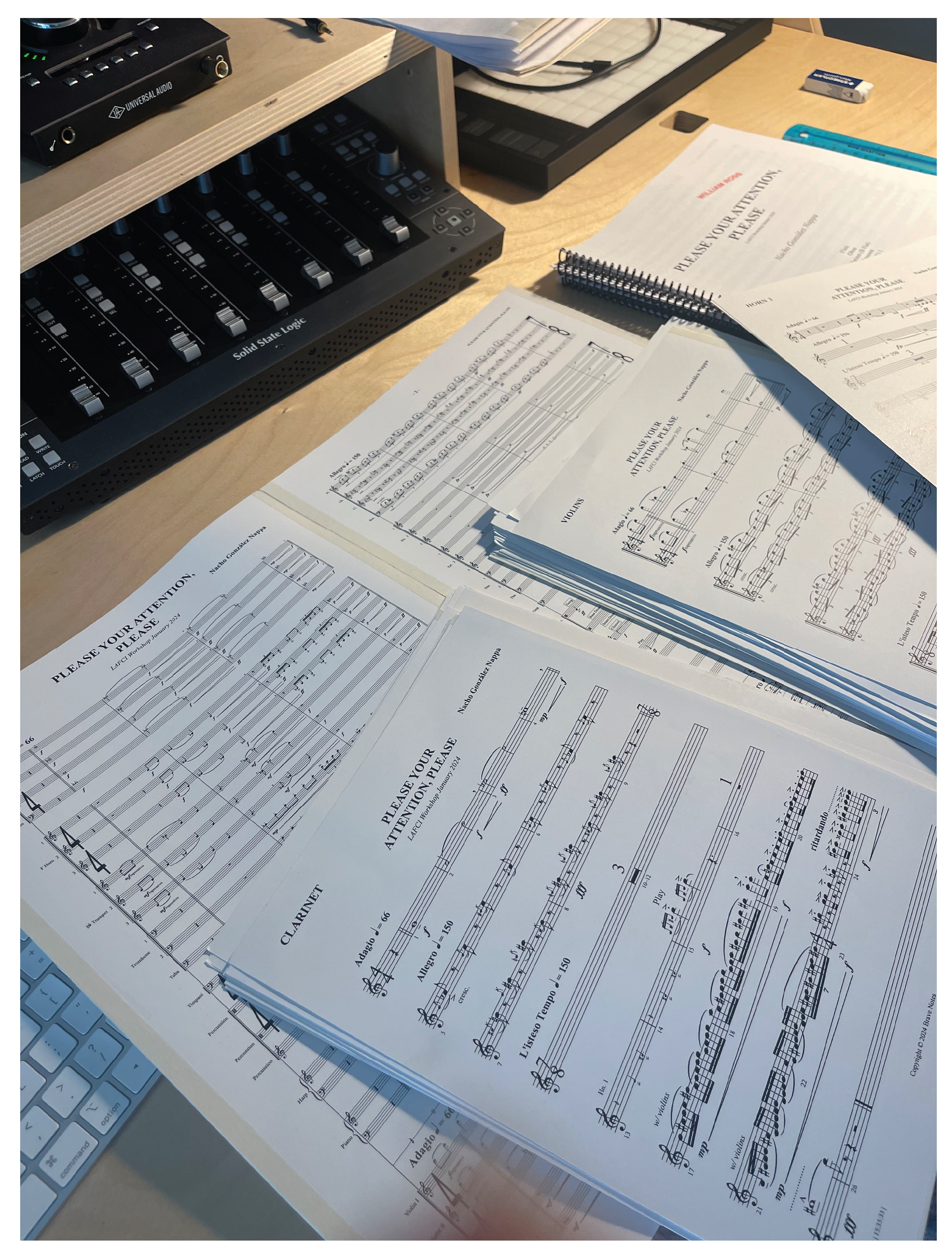
the score, #MadeWithDorico
AN: Nacho, you mentioned switching to Dorico five years ago. What prompted this switch, and how has Dorico enhanced your music notation workflow compared to other software? In addition, can you share a specific instance where Dorico’s features played a crucial role in overcoming a challenge in your music notation process?
NG: The bigger the ensemble the more precise your notation must be. Every detail counts. I was frustrated with the other notation software I was using. A friend of mine recommended Dorico to me. I tried it and never looked back. For me, using Dorico is like playing an instrument. It’s fun and creative. It’s almost a game. I’m able to write really fast, try things quickly, move lines across the different instruments, copy things from one corner of the page to the other, etc. And on top of that, my editing is minimal. One particular aspect I love about Dorico’s workflow is the use of page templates and tokens. This allows you to make changes to the whole project at once, and quickly adapt your engraving to your needs. Dorico just makes the overall experience of writing incredibly pleasant. That’s really hard to accomplish with a piece of software.
I switched to Dorico and never looked back. For me, using Dorico is like playing an instrument. It’s fun and creative. It’s almost a game. I’m able to write really fast, try things quickly, move lines across the different instruments, copy things from one corner of the page to the other, etc. And on top of that, my editing is minimal. One particular aspect I love about Dorico’s workflow is the use of page templates and tokens. This allows you to make changes to the whole project at once, and quickly adapt your engraving to your needs. Dorico just makes the overall experience of writing incredibly pleasant. That’s really hard to accomplish with a piece of software.
AN: Moving on to your teaching role at Berklee, can you share a little bit on your role and how do you see the future of music in the gaming industry evolving?
NG: I teach interactive scoring. Berklee recently created the Games and Interactive Scoring Major, under the incredible vision and passion of Michael Sweet and Sean McMahon. The videogame industry today is bigger than film and music combined. There’re 3.3 billion active gamers in the planet and in 2023 the game industry generated over $184 billion. It’s a huge form of storytelling that we’ve to pay attention to. Film music is an established 100+ year old language. There are certain codes that you’ve to follow. In contrast, games are an emerging language. No one really knows how to do a game, not even how to score the music for that game. We’re all trying to figure it out. And that’s what’s exciting about this field. There’s a big difference between composers and interactive composers. As interactive composers we have to deeply understand gameplay and create musical solutions to enhance the experience of the player. We don’t know how long a player is going to take to complete a certain task. Our music has to react to what the player is doing. We have tools like Wwise and Fmod to implement these musical solutions. We can map our music to the health or the distance of a player. We can also create random phrases that are interchangeable, or we can activate the reverb in a certain instrument when the player is in a cavern. The possibilities are endless. This is a golden era for games and interactive music, and I’m happy to be part of this community. Berklee is my alma matter, so it’s beautiful to give back to this community. I’m based in Los Angeles, and teach remotely. Many students want to come to LA after they graduate, so it’s great to share my experience in that regard.
AN: In your experience, how has the role of a composer evolved with the increasing influence of technology, and how do you balance the traditional aspects of composing with the demands of the modern industry?
NG: The best ideas usually come from the intersection between different disciplines. Computers and software are tools that expand my capacity to execute. But these tools can have bias that force me to work in a certain way. Why am I writing in 4/4? Why am I writing in 120 bpm? Why am I writing in C? Is this really what I want? Dorico encourages you to make these decisions yourself. With the rise of AI, it’s crucial to be an expert in humanity. Excel in the things that only humans can do. We should ask ourselves: what defines us as humans? Let’s find that corner of the world that computers can’t conquer and instead of trying to be the best one, let’s try to be the only one. We might need to go back to old books, talk to friends about their dreams, get really good at expressing our emotions with our instruments. If we master these things, we’ll be able to leverage the amazing tools that technology gives us.
AN: Looking ahead, do you have any exciting projects or collaborations in the pipeline that involve using Dorico?
NG: I’m currently writing a symphonic piece based on the tragedy of the Andes. I’ve been working on this project for many years, and I’m almost done. I got to meet many of the survivors, and some of the actors of the movie that Netflix just released The Society of The Snow. Roberto Canessa, one of the heroes of this monumental story, is also the person who saved my life when I was in the womb of my mother. He’s a cardiac paediatrician and they couldn’t hear my heart. The piece is based in the heartbeat as a symbol of life and I’m really excited to share it soon. On the other hand, I’m scoring 5 different games, each of them at a different stage. And I’m planning to release my first contemporary classic album, with pieces I wrote over the past few years, all of them done in Dorico!
AN: Lots of exciting stuff! Many thanks for your rime, Nacho and good luck with your future projects!
📹 Watch the recording session with the Hollywood Symphonic Orchestra, at Warner Bros Studio, Los Angeles:
👇

